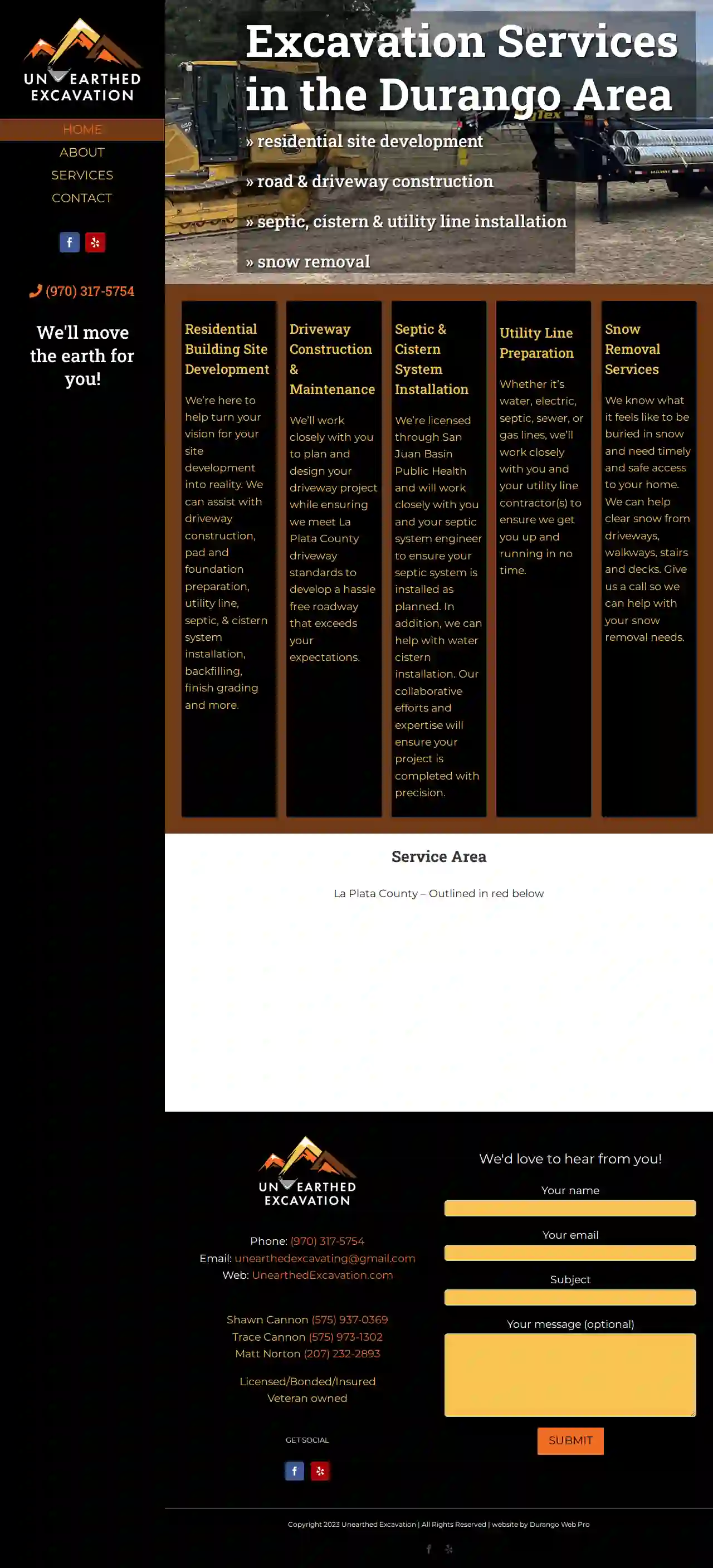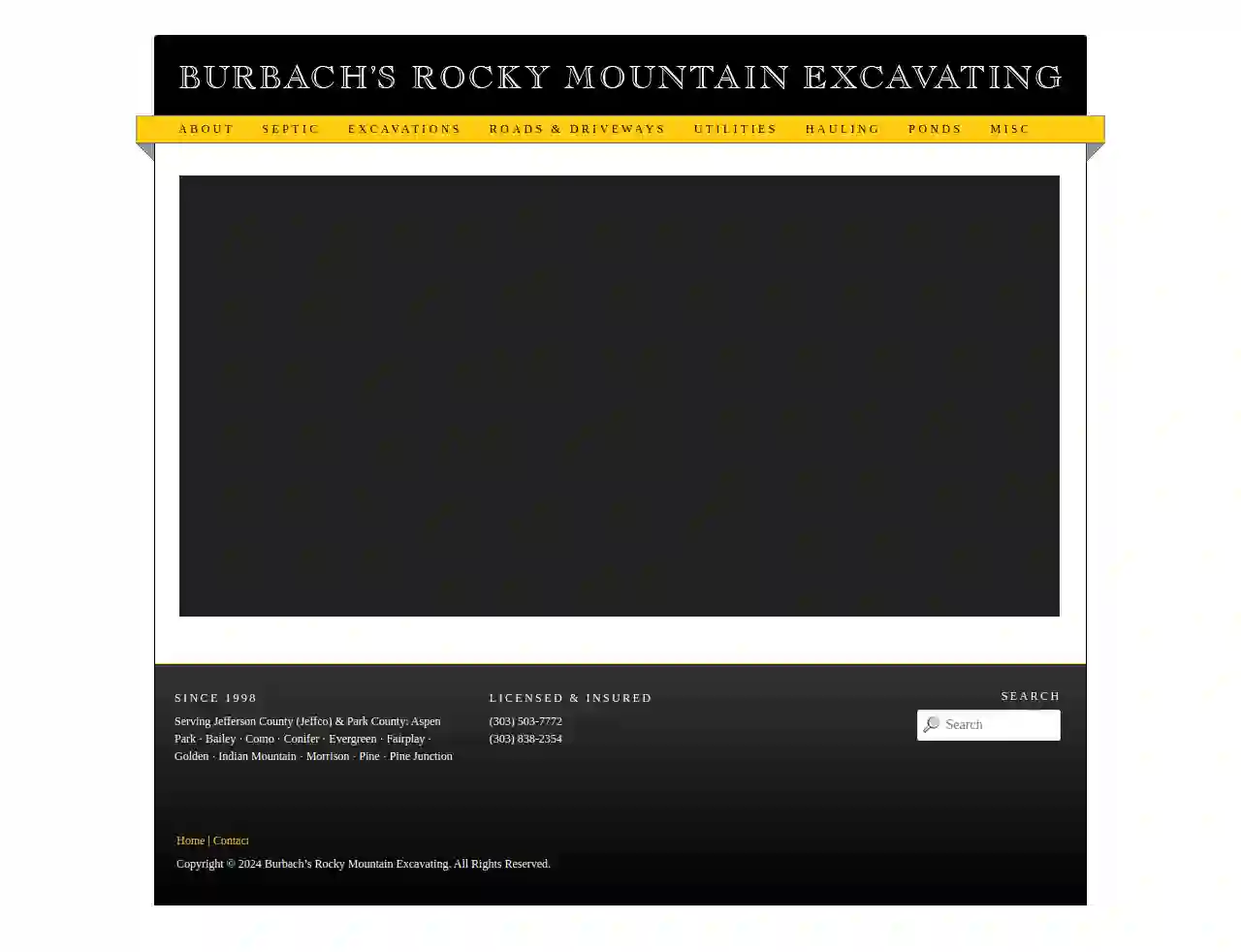Dirt Contractors Boulder
Top 10 Dirt Contractor in Boulder
Receive 3 FREE Dirt Contractor quotes for your project today! Compare profiles, reviews, accreditations, portfolio, etc... and choose the best deal.

Colorado Hydrovac
1423 25th Street, Greeley, 80631, USColorado Hydrovac and Environmental Services offer a wide variety of Hydro Excavating, and Construction Services. Ryan and Scott’s combined experience ensures each client receives the safest work practices, and ensures each job is done correctly and efficiently every time. Whether your job is large or small, call Tri-State Construction today for prompt, professional service. In addition to our Hydrovac excavation services, our construction division Tri-State Construction expands our offerings to better serve our clients throughout Colorado and surrounding states.
- Services
- Why Us?
- Gallery
Get Quote
chuckEX
4.79 reviewsBoulder, USAbout Us chuckEX was born out of a love of moving earth, big toys and a disdain for the ethics of many of the contractors who run them. Put simply, we enjoy what we do and we will do what we can to make it enjoyable for you as well. Our commitment is to be transparent with our customers about what we are doing and to bring to light the risks and costs involved. We strive to set expectations properly at the beginning, under-promise and over-deliver. Doing our best to expose possible surprises at the beginning of the project so that our customers have a clear picture of what the project entails. We want to take the anxiety out of excavation!
- Services
- Why Us?
- Testimonials
- Gallery
Get Quote
Colorado Rock & Dirt Excavation Inc.
51 reviews2039 East US 160, Pagosa Springs, 81147, USAbout Us Colorado Rock & Dirt Excavation, INC. (CRD) has been in business in Pagosa Springs, Colorado since 2008 and is recognized as a leading contractor by both public and private sectors. We have established a reputation for uncompromised quality, reliability, and value. We specialize in all phases of earth moving, grading, snow removal, and excavation. We service the needs of any customer ranging from residential, commercial, civil, agricultural, decorative, and repair. We strive to provide the most cost-effective site solution for any project. For the most thorough and detailed excavation and demolition work in Pagosa Springs, few firms can compare to Colorado Rock & Dirt Excavation INC. Built with quality as our primary focus, our reputation for flawless work stretches far and wide. With us, you get a service-oriented excavation partner that knows what it means to deliver top-notch solutions, meet deadlines, and follow your project specifications. We value your business and will work hard to ensure you call us the next time you have an excavation job. Contact Colorado Rock & Dirt Excavation INC at 970-264-3478 for peerless excavation work at affordable prices.
- Services
- Why Us?
- Gallery
Get Quote
Colorado Excavation LLC
4.714 reviewsRye, Colorado, USWork with Us At Colorado Excavation LLC, we specialize in a wide range of services, including water and sewer excavation, septic system excavation, land clearing, driveway construction, foundation excavation, and building pad preparation. Located in Rye, Colorado, we are committed to delivering top-notch excavation services. Whether you’re a homeowner, builder, real estate agent, or contractor, we have the expertise you can trust to get the job done. At Colorado Excavation LLC, we understand the importance of precision and quality when it comes to excavation work. We specialize in the following services… About Us Colorado Excavation LLC is a local business in Rye, Colorado that prides itself on quality and efficiency at a reasonable price. Owner and Operator Mike Robeda started his love for excavation at a very young age. Growing up in the industry, he quickly learned what it takes to run a successful business. Not only the skills of the trade but also customer service, integrity, consistency, and a whole lot of hard work. Today, he does just that. From the initial consultation to the completion of your project, Mike works closely with you to understand your specific needs, provide expert guidance, and ensure a smooth and successful excavation process.
- Services
- Why Us?
- Our Team
- Testimonials
- Gallery
Get Quote
Rapid Excavation, LLC
52 reviewsBirmingham Business Park, Unit 1, 1000, Birmingham, B18 6NF, USAbout Rapidex Rapidex is a leading provider of rapid prototyping and low-volume manufacturing services. We specialize in helping businesses bring their ideas to life quickly and efficiently. Our team of experienced engineers and technicians can help you with every step of the process, from design and development to production and assembly. We offer a wide range of services, including: 3D printing CNC machining Injection molding Sheet metal fabrication Assembly and finishing We are committed to providing our customers with the highest quality products and services. We use the latest technology and equipment to ensure that your project is completed on time and within budget. Contact us today to learn more about how we can help you bring your ideas to life.
- Services
- Why Us?
Get Quote
Stan Miller Inc
3.914 reviewsBoulder, US- Services
- Why Us?
Get Quote
Schofield Excavation Hector Placer
51 reviewsBoulder, US- Services
- Why Us?
Get Quote
Grade A Excavation & Landscape Inc.
4.715 reviewsBoulder, US- Services
- Why Us?
Get Quote
Unearthed Excavation
1Boulder, US- Services
- Why Us?
Get Quote
Burbach's Rocky Mountain Excavating
44 reviewsBoulder, US- Services
- Why Us?
Get Quote
Over 3,943+ Excavation Businesses on our directory
Our excavation companies operate in Boulder and surrounding areas!
ExcavationHQ has curated and vetted Top Excavation Businesses in Boulder. Find a top & reliable contractor today.
Frequently Asked Questions About Dirt Contractors
- Clean Fill: Consists of uncontaminated soil, rock, or gravel, free from organic matter, debris, or hazardous substances. Suitable for most construction and landscaping projects.
- Structural Fill: A compacted granular fill, typically gravel, crushed stone, or a mixture of both, used for structural support and drainage. Ideal for foundations, roadways, and retaining walls.
- Engineered Fill: A specifically designed and blended soil mix with controlled properties, such as compaction, drainage, or bearing capacity, tailored for particular applications.
- Unsuitable Fill: Materials like topsoil, organic matter, or contaminated soil that are not suitable for structural fill due to their potential for decomposition, settlement, or environmental concerns.
- Efficiently Spread and Level Dirt: Using specialized equipment like bobcats or skid steers to ensure even distribution and proper compaction.
- Achieve Precise Grading: Following specific grades and contours for drainage or construction purposes.
- Handle Large Volumes of Dirt: Managing large deliveries and removals with dump trucks and other heavy machinery.
- Minimize Risks and Ensure Safety: Working safely and efficiently, reducing the potential for injuries or property damage.
What are the different types of fill dirt?
How much dirt do I need for my project?
1. **Measure the area:** Determine the length, width, and depth (in feet) of the area where you need dirt.
2. **Calculate the volume:** Multiply the length x width x depth to get the volume in cubic feet.
3. **Convert to cubic yards:** Divide the cubic feet volume by 27 (there are 27 cubic feet in one cubic yard).
**Example:**
If your area is 10 feet long x 5 feet wide x 2 feet deep, the volume would be: 10 x 5 x 2 = 100 cubic feet
To convert to cubic yards: 100 / 27 = 3.7 cubic yards (round up to 4 cubic yards to ensure you have enough).
It's advisable to consult with a dirt contractor or landscaper for more accurate calculations, especially for complex projects or irregular-shaped areas.
Can I spread dirt myself, or should I hire a professional?
What is the difference between topsoil and fill dirt?
Topsoil: The uppermost layer of soil, characterized by its rich organic matter content, nutrients, and dark color. It's essential for supporting plant growth and is commonly used for gardening, landscaping, and lawn establishment.
Fill Dirt: Primarily composed of subsoil or excavated materials, generally lacking the organic matter and nutrients found in topsoil. It's typically less fertile and used for structural purposes, such as filling in low areas, leveling ground, or creating raised beds.
Understanding the difference between topsoil and fill dirt is crucial for choosing the appropriate soil type for your specific project needs.
What are the different types of fill dirt?
- Clean Fill: Consists of uncontaminated soil, rock, or gravel, free from organic matter, debris, or hazardous substances. Suitable for most construction and landscaping projects.
- Structural Fill: A compacted granular fill, typically gravel, crushed stone, or a mixture of both, used for structural support and drainage. Ideal for foundations, roadways, and retaining walls.
- Engineered Fill: A specifically designed and blended soil mix with controlled properties, such as compaction, drainage, or bearing capacity, tailored for particular applications.
- Unsuitable Fill: Materials like topsoil, organic matter, or contaminated soil that are not suitable for structural fill due to their potential for decomposition, settlement, or environmental concerns.
How much dirt do I need for my project?
1. **Measure the area:** Determine the length, width, and depth (in feet) of the area where you need dirt.
2. **Calculate the volume:** Multiply the length x width x depth to get the volume in cubic feet.
3. **Convert to cubic yards:** Divide the cubic feet volume by 27 (there are 27 cubic feet in one cubic yard).
**Example:**
If your area is 10 feet long x 5 feet wide x 2 feet deep, the volume would be: 10 x 5 x 2 = 100 cubic feet
To convert to cubic yards: 100 / 27 = 3.7 cubic yards (round up to 4 cubic yards to ensure you have enough).
It's advisable to consult with a dirt contractor or landscaper for more accurate calculations, especially for complex projects or irregular-shaped areas.
Can I spread dirt myself, or should I hire a professional?
- Efficiently Spread and Level Dirt: Using specialized equipment like bobcats or skid steers to ensure even distribution and proper compaction.
- Achieve Precise Grading: Following specific grades and contours for drainage or construction purposes.
- Handle Large Volumes of Dirt: Managing large deliveries and removals with dump trucks and other heavy machinery.
- Minimize Risks and Ensure Safety: Working safely and efficiently, reducing the potential for injuries or property damage.
What is the difference between topsoil and fill dirt?
Topsoil: The uppermost layer of soil, characterized by its rich organic matter content, nutrients, and dark color. It's essential for supporting plant growth and is commonly used for gardening, landscaping, and lawn establishment.
Fill Dirt: Primarily composed of subsoil or excavated materials, generally lacking the organic matter and nutrients found in topsoil. It's typically less fertile and used for structural purposes, such as filling in low areas, leveling ground, or creating raised beds.
Understanding the difference between topsoil and fill dirt is crucial for choosing the appropriate soil type for your specific project needs.